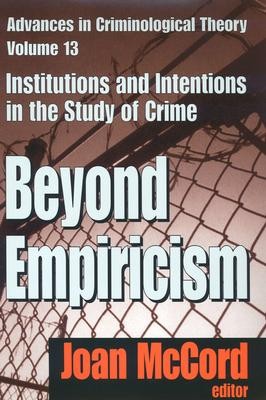| Beyond Empiricism: Institutions and Intentions in the Study of Crime Contributor(s): McCord, Joan (Editor) |
|||
 |
ISBN: 0765802511 ISBN-13: 9780765802514 Publisher: Routledge
Binding Type: Hardcover - See All Available Formats & Editions Published: May 2004 Annotation: Beyond Empiricism expands the discourse on theories of criminal behavior. It considers institutional, social, and individual issues related to criminal behavior, while individually each raises questions about the adequacy of current theoretical claims. The topics have significant implications both for policy and research in criminology. Click for more in this series: Advances in Criminological Theory |
||
| Additional Information |
| BISAC Categories: - Social Science | Criminology |
| Dewey: 364.3 |
| LCCN: 2004043970 |
| Series: Advances in Criminological Theory |
| Physical Information: 0.84" H x 6.36" W x 9.44" L (1.00 lbs) 196 pages |
| Features: Bibliography, Illustrated, Index |
| Descriptions, Reviews, Etc. |
| Publisher Description: Beyond Empiricism expands the discourse on theories of criminal behavior. It considers institutional, social, and individual issues related to criminal behavior, while individually each raises questions about the adequacy of current theoretical claims. The topics have significant implications both for policy and research in criminology. Per-Olof Wikstrom introduces a cross-level action theory of crime. He suggests that better understanding of causal mechanisms can lead to a situational theory of action based on perception of alternatives and the process of choice. David Wolcott and Steven Schlossman provide new perspectives on the issues of racial disparity and the incarceration of adolescents in adult prisons. These authors highlight gaps in our understanding of early twentieth-century juvenile justice and negate some popular claims about recent changes in the criminal law. Peter Grabosky spotlights privatization policies in the criminal justice system, suggesting a framework for analyzing the balance of advantage resulting from three basic forms of institutional relationships in policing. Steven Messner and Richard Rosenfeld discuss why institutional analysis has been seriously underdeveloped in etiological analyses of crime. Jordan Pederson and Matthew Shane scrutinize the concept of aggression. Their descriptions of aggressive behavior among non-human animals provide a fascinating backdrop for understanding human actions. Joan McCord emphasizes the intentionality of crimes as she argues that to understand what causes crime, one must have a theory about what it means to act intentionally. After critically appraising prior theories, McCord introduces and defends a new theory of motivation based on a post-empiricist theory of language. This latest volume in the distinguished Advances in Criminological Theory series continues to add to the theoretical underpinnings of the field, and will be important to all collections of social science research on criminology. |
Contributor Bio(s): McCord, Joan: - Joan McCord (1930-2004) was professor of criminal justice at Temple University. Among her publications are The Psychopath and Origins of Crime (both with W. McCord); her edited volumes include Juvenile Crime, Juvenile Justice (with C. S. Widom and N. Crowell), Violence and Childhood in the Inner City, Coercion and Punishment in Long-term Perspectives, and Preventing Antisocial Behavior: Interventions from Birth through Adolescence (with R. Tremblay). |
| Customer ReviewsSubmit your own review |
| To tell a friend about this book, you must Sign In First! |